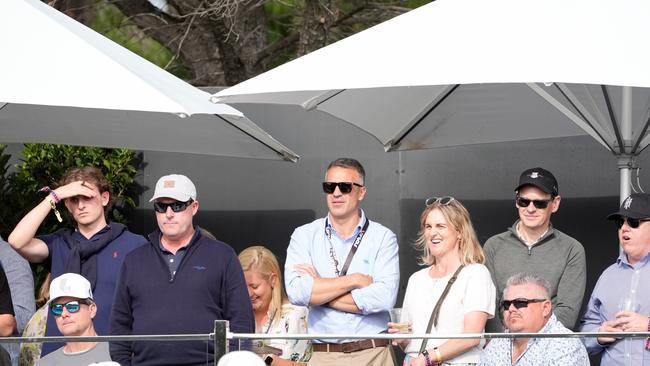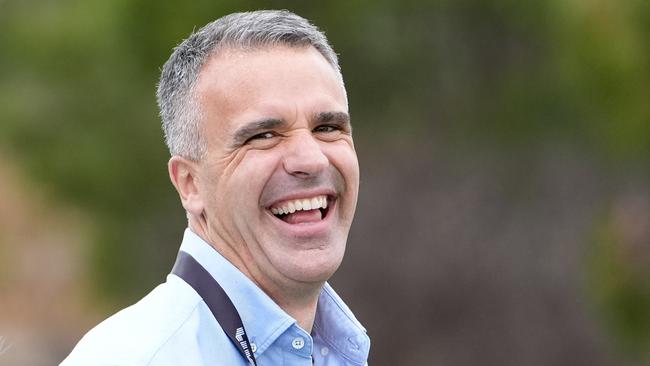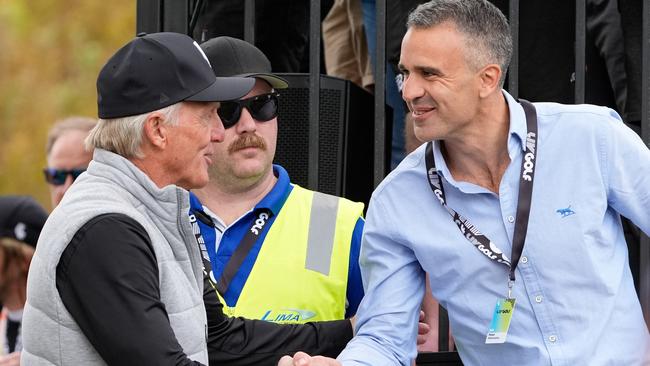Premier’s centrist stance suits Mali Liberals to a tee
In the same way Ronald Reagan had the Reagan Democrats and John Howard the Howard Battlers, a group of voters has emerged in South Australia who could be described as the Mali Liberals.

Barely two years after securing a surprise victory at the 2022 South Australian election, Peter Malinauskas finds himself in the equally surprising position of being the longest-serving Premier in the land.
At the halfway mark of his first term in office and at the age of just 43, Malinauskas is too new and too young to be afforded anything resembling elder statesman status. But with Queensland’s Steven Miles trudging towards the abyss and the Andrews-Allan baton change in Victoria coinciding with that state’s descent into fiscal penury, Malinauskas is not only the longest-serving premier but probably also the Premier most likely to hold the job for as long as he likes.
One of the key reasons for his ascendancy is his determination to keep business happy. In his first profile piece for this newspaper, published the year before he consigned Steven Marshall’s Liberals to a one-term government, Malinauskas was asked what he believed Labor’s vision should be. “The expansion of the middle class,” he said.
After two years in power, and with two budgets under his belt that neither raised existing taxes nor introduced new ones, Malinauskas is enjoying significant support from people who historically have lined up for the Liberals.
In the same way Ronald Reagan had the Reagan Democrats and John Howard the Howard Battlers, a group of voters has emerged in South Australia who could be described as the Mali Liberals: traditional small government, anti-PC voters whose hardwired dislike of the ALP is being eroded by Malinauskas’s centrist, commonsense approach.
This phenomenon has a unique Covid-related element. Malinauskas’s Steven Bradbury-esque 2022 surge came as Marshall lost the support of business over what it saw as his hands-off approach to Covid management.

In record time, having ridden the high of 80 per cent-plus approval ratings at the onset of the pandemic, Marshall ended it being denounced by key business figures and industry groups for perceived acquiescence to chief health officer Nicola Spurrier.
Sensing the mood, Malinauskas pledged that if he were premier, he – not the public service – would be running the state’s Covid management meetings. He said the state should be controlled by its elected leaders, not an unelected bureaucracy with no skin in the game when it came to business closures.
Business swung behind him, and since Malinauskas was elected, he has done pretty much everything he can to keep them there.
No Newspoll has ever been conducted on the voting intentions of the 94,000 people who attended Adelaide’s LIV Golf Tournament at the award-winning Grange Golf Course. You could safely hazard a guess that at least 70 per cent of this overwhelmingly male crowd would be Liberal voters, from the tradies and beer-drinking buddies who queue along the fairways to the cashed-up crowd in the hospitality tents lining the famously boisterous Watering Hole, the Par 3 12th where tickets to the exclusive Cellar Door atop the green max out at $10,000 a throw.
These are people who support wealth, don’t want government interfering in their lives, like having fun and have no truck with woke politics. They’re the people who, on hearing South Australia’s left and, bafflingly, even the SA Liberals denounce Malinauskas for spending public money to secure a Saudi-backed golf tournament, replied: “Great, so when do tickets go on sale?”
For the second year running, at LIV this April Malinauskas found himself incapable of getting from one side of the Grange course to the other without being stopped for handshakes, back-slaps and selfies. It was the reverse of Anthony Albanese at the Australian Open or Scott Morrison at the NRL, unadorned and uniform acclaim, just as it was when the Premier received a near-ovation last year as he strode to the centre of a packed Adelaide Oval to announce SA had secured the rights to the AFL’s Gather Round for a full four years.

Malinauskas spent much of his Saturday at LIV this year inside the Watering Hole, greeting visitors from overseas and interstate in the lavish marquee hosted by SA Tourism to promote visitation to what has long been Australia’s forgotten destination.
He spent time that day with some of the state’s most successful business figures including SA’s fourth richest man, supermarket mogul Roger Drake. Malinauskas befriended Drake years ago as head of the retail union the SDA, where he took an Accord-style approach to his dealings with the likes of Drake Supermarkets, seeking reasonable pay rises in return for sustained industrial peace. He was also joined at the golf by Peter Hurley, SA’s most successful hotelier and its longest-serving Australian Hotels Association president, who counts John Howard as a friend and was appointed by the former PM to serve on the ABC board.
“Both in opposition and government, Mr Malinauskas has shown empathy toward the business sector and in both roles a preparedness to listen to both concerns and suggestions for how the state can be better for all South Australians,” Hurley tells Inquirer. “His enthusiasm for event-based tourism has been a massive boost for the entire economy of our state.”
Malinaukas also wins surprise if qualified acclaim from the SA Master Builders Association, a historically pro-Liberal organisation in SA whose chief executive Will Frogley was an adviser to former Liberal treasurer Rob Lucas.
“He must be stronger on the increasingly aggressive Victorian CFMEU presence in SA,” Frogley tells Inquirer. “A lot of members tell me they are upset about the Victorians dictating what to do in their own backyard, and that they have lost control of their business as a result. But as a proud South Australian I love hearing that our economy is leading the pack, that we topped Commsec State of the States.
“Peter needs to hold his nerve and stay committed to being business friendly so he can keep delivering for South Australia.
“It’s been great working with Peter. In my opinion he’s the most impressive Premier in Australia right now. After so much years in the doldrums SA finally has its mojo back. There’s a renewed sense of confidence and appreciation for what we have here, and the Premier’s vision and work ethic have definitely contributed to that.”
Away from the bells and whistles of golf and Aussie rules, Malinauskas is showing a policy approach that could turn him into a significant national figure within the ALP, through his preparedness to tackle prevailing orthodoxies on energy and to demonstrate fiscal restraint and rectitude now long gone in Victoria and Queensland.
While federal Labor moved belatedly to get its own policy house in order this month with a pro-gas statement that reads more like a reminder note, Malinauskas can point to years of unabashed support for the gas sector, support for fracking and a great working relationship with Santos, where his brother Rob Malinauskas worked for years in a senior policy role.
His government has signed off on a $200m feasibility study to build a desalination plant for BHP, with Malinauskas steeling himself for a blue over inevitable cries that its mooted $5bn price tag be best spent on health and education, the Premier set to argue that the economic activity it will unleash will underpin greater state prosperity.
And on nuclear Malinauskas has shown a repeated preparedness to challenge the Left faction orthodoxies epitomised by our Prime Minister, openly highlighting the absurdity of Australia being a signatory to AUKUS, contractually bound to build nuclear-powered subs and house high-level nuclear waste, with the Albanese government laughably insisting it wants no part of the nuclear fuel cycle.
In a domestic setting, Malinauskas’s authority was underscored in recent weeks with two things. The first was a Labor victory in the Dunstan by-election, the final insult for the SA Liberals where former premier Marshall’s seat of 14 years fell to the ALP thanks to a 3 per cent swing away from the Liberals – a dismal result against a new government halfway through its first term.
The second was a major cabinet reshuffle that reduced the policy influence of Left faction ministers, the biggest winner being former Liberal and now independent MP Dan Cregan, whose surprise promotion to four major portfolios was a demonstration of Malinauskas’s promise to govern from the centre.
Malinauskas is not without his challenges. He has still failed – dismally – to honour his vaunted election promise to fix ambulance ramping. He is about to endure the awkwardness of ushering in the nation’s only Indigenous voice, some members of which received just six votes and will now enjoy the right to address the state’s parliament. There are a lot of traditional Liberal voters who regard those two things as reason enough to turf the bloke out.
Equally, strangely, as things stand, there’s more than a few traditional Liberal voters in SA who’d be sorry to see him gone.






To join the conversation, please log in. Don't have an account? Register
Join the conversation, you are commenting as Logout